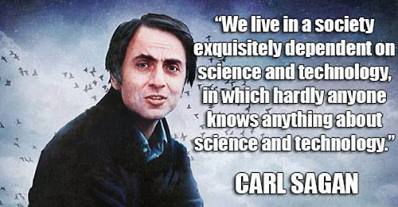
Within science fiction and the wider society there is this idea that we’ll find aliens. I always find it funny when humans talk about discovering “other” intelligent life in the universe. Just a wee bit arrogant to consider ourselves intelligent. Yes, I do realise that I’m arguing that point using technology based on quantum mechanics, probably being read on a device that weighs less than 200g and fits in your pocket, linked by a distributed network, connected by orbital satellites. Science: it works….. bitches.
But I would continue my argument by saying that to some people that amazing interface of technology, that is allowing this blog post to be read around the world, might as well be explained as “magic, magic, magic, magic, magic, god did it.” I certainly couldn’t explain how quantum mechanics works, nor how it applies to communications technologies, let alone how it manages to stream all of my favourite porn media to my phone. Thus Arthur C Clarke’s third law – Any sufficiently advanced technology is indistinguishable from magic – holds true for the vast majority of people on this planet.
Now the argument against Clarke’s third law is that technology isn’t magic. In fact, in the entire history of human civilisation, with all the things that have been attributed to magic, all the great mysteries of the universe, once investigated, have turned out to be not magic. But I’m talking about the knowledge gap between the average person and the specialist in the field who develops all this cutting edge stuff that allows other specialists to do cool stuff; like making a hoverboard. We are surrounded by everyday items that most of us would struggle to explain the concept of how they work – magnets, how do they work? – let alone understand the complexities involved – magnets, this is how they work.
Douglas Adams brilliantly satirised this idea in his novel Mostly Harmless. Arthur Dent crash lands on an alien planet where the local humanoid populace are rather backward in comparison to us humans. Arthur comes from a planet of television, cars, planes, computers: all sorts of neat stuff. But he doesn’t know how any of it works, nor how to go about reverse engineering any or it. So he becomes the sandwich maker.
Essentially, we point to all of our human achievements to show how smart we are, but in reality most of us haven’t the first clue about any of those achievements. We just aren’t as smart as we would like to think.
Now compare this to aliens. Humans are pretty proud of having gone to the moon, cashing in on all 12 of us who have done so, but to be visited by aliens requires interstellar travel. That requires technology we probably haven’t even dreamed of yet (possibly not, e.g. warp). An alien race that can do that is so far beyond human achievement and intelligence. Thus, I’m suggesting that even at our best, we would be babbling morons in comparison to an intelligent life-form that has managed interstellar travel.
Sure, the aliens that decide to cross interstellar space may be the Cleatus of their species. Their technology may actually have reached the point of sentience and doesn’t require anything of its “makers”. But think of how advanced such a species would be, not to mention how arrogant (rightly or wrongly). There is no reason for them to look upon Earth and see humans as intelligent (e.g. climate change and reality TV). There is also no reason to believe that we’d even notice these aliens. An intelligent life-form travels between star systems, has the technology for that not to have taken billions and billions of years, and some dude with an out of focus camera is going to be the only person to see them?
So I think that humans are rather egotistical to think of ourselves as intelligent life in the universe. I also think that it is arrogant to believe that an alien species would regard us as intelligent. I also think that we’d have little chance of encountering intelligent alien life unless they wanted to be encountered. This is just my view, but the main thing is, Neil DeGrasse Tyson agrees with me (or is that I agree with him?):

